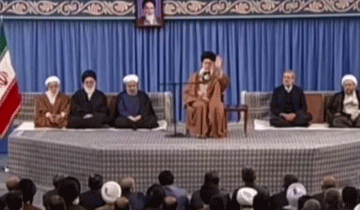Bigotry: The Dark Danger
Lessons in leadership

"The leader of the people is their servant." - The Prophet Muhammad
Prophet Mohammed was an excellent human being. Born and raised in the brutal atmosphere of ancient Arabia, where violence and bloodshed was the norm, he shone as a symbol of pure integrity, kindness and nobility. This fineness of character was so prominent, it earned him the name Ameen (the trustworthy) even before he became a Prophet.
He was also an excellent leader. His ability to steer through extremely difficult situations with the guidance of the Qur’an and his genius allowed him to arise out of a bloodthirsty society –dangerous and determined to harm him - unharmed and victorious through peace and diplomacy.
When he became a prophet and started spreading the beautiful message of God, the response of his people was extremely hostile. But, he was unstoppable.
As the years passed and the number of his followers increased, so did the level of persecution. When these violent attacks reached unbearable levels, he sent his most vulnerable companions to present-day Ethiopia, which was a Christian kingdom back then, to ensure their safety. Others followed suit, but the Prophet stayed behind until he made sure that everyone left. He put the safety of his people before his own.
When he migrated to Medina, the city was embroiled in constant clashes between tribes that vied for control. However, he successfully mediated between these groups, who were Jews, Muslims and pagans and drew up a treaty that is considered the world’s first. With this treaty, he essentially built the world’s first pluralistic society where all citizens were equal and where their rights were equally secured. The significance of his achievement can be better understood in the light of today’s constant conflicts between different groups, and how they cannot be solved no matter how many leaders or international organizations work to do it.
As the years went on, the number of Muslims grew and Prophet Mohammed became one of the strongest men in Arabia. However, no matter how powerful he was, he continued to amaze with his extremely humble and kind disposition. He was so approachable that anyone – be a Muslim, Christian, Jew, slave, tribe leader – could just walk inside his mosque and start a conversation with him.
Throughout his life, his gentle nature drew people to him. His deep love and respect for women, children and animals had a profound effect on society which had absolutely no such concepts up to that point.
After six years in Medina, the Prophet wanted to go back to Mecca to do hajj. But this meant that he would be unarmed, because Muslims are not allowed to carry weapons during the hajj. In other words, he was walking into the midst of his enemies unarmed, only with his trust in God. When they were stopped by a Qurayshi cavalry and were denied entry to Mecca, Prophet Mohammed chose diplomacy and peace. But the Qurayshi nevertheless broke the treaty, prompting the Prophet to gather an army of 10,000. They expected the Prophet to storm into Mecca and take revenge for years of torture and oppression. However, in the finest example of true leadership, he didn't do that. Instead, he declared a general amnesty, including for his former enemies, and said that no one would be forced to convert to Islam. He showed that peace should always be chosen over war and that only a true leader can lead his people towards the goodness.
Barnaby Rogerson, the author of ‘The Prophet Mohammed: A Biography’ explains this beautiful moment of forgiveness: '’He pardons the Meccans, but not just pardons, he pardons with kindness.’’
Today we are in dire need of such leadership: Leaders that are brave, just, humble, and compassionate… And there are certainly countless lessons to be learned in the life of the Prophet Mohammed that can offer us great insight.
Adnan Oktar's piece in Gulf Daily News & Morocco World News:
http://www.gdnonline.com/Details/252499/Lessons-in-leadership
https://www.moroccoworldnews.com/2017/09/227695/leadership-prophet-mohammed-islam/




